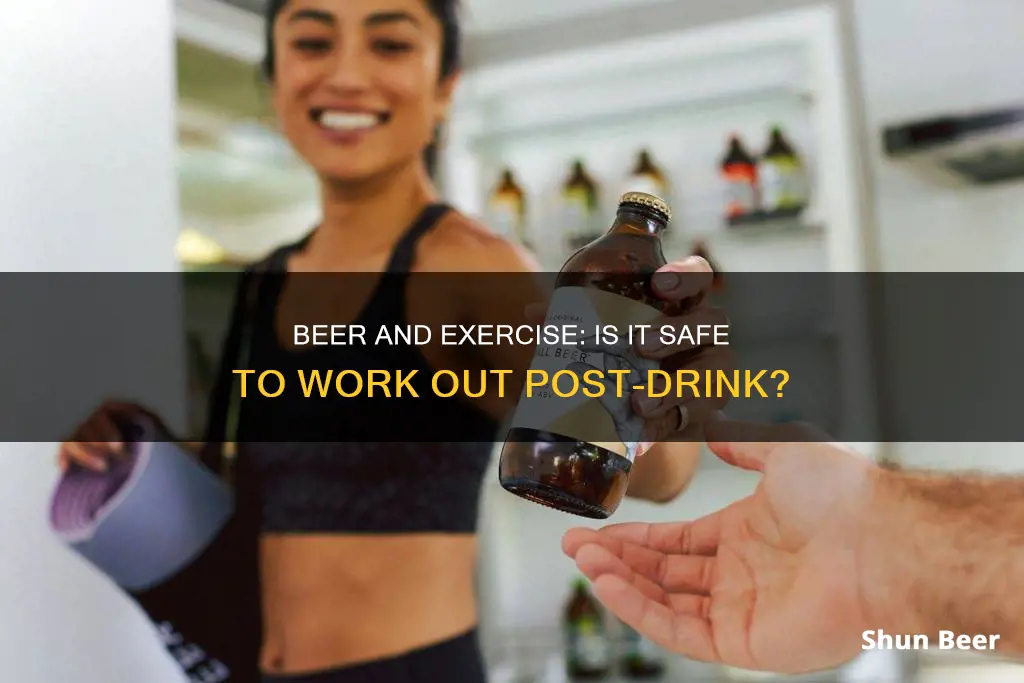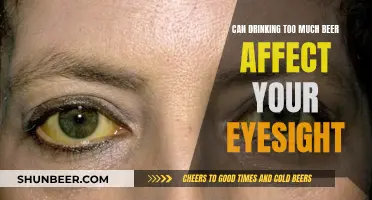
Drinking alcohol and exercising is a bad idea. Even one drink can affect your brain and muscle function, leading to a higher risk of injury while exercising. Alcohol slows down your reflexes, impairs your balance and hand-eye coordination, and lowers your inhibitions, which can lead to serious injuries. It also increases the risk of dehydration, as it is a diuretic that promotes urine production. Additionally, drinking can negatively impact muscle growth and recovery by impairing protein synthesis and decreasing growth hormone and testosterone levels. The effects of alcohol can vary depending on factors such as genetics, tolerance, weight, and food consumption. While it may be tempting to combine social drinking and working out, it is essential to prioritize your health and safety by refraining from exercising after consuming alcohol.
| Characteristics | Values |
|---|---|
| Effects on the body | Alcohol affects the major parts of the brain, protein synthesis, hormones, and more. |
| Short-term effects | Flushing of the skin, impaired judgment and coordination, gastrointestinal problems, high blood pressure, dehydration, and more. |
| Long-term effects | Chronic heavy alcohol use can lead to cardiovascular issues, liver damage, and multiple types of cancer. |
| Effects on exercise | Alcohol negatively impacts reflexes, balance, hand-eye coordination, endurance, energy levels, and muscle growth and recovery. |
| Recommendations | Wait 1-2 hours per drink before exercising. Keep the workout short and light. Drink plenty of fluids. Eat a solid meal before drinking. |
What You'll Learn

Dehydration and the risk of heat stroke
Dehydration and heat stroke are two very common heat-related conditions that can become life-threatening if left untreated. Dehydration is a precursor to heat stroke, and both can occur when an individual is overexposed to the sun and not drinking enough water.
Dehydration
Dehydration happens when the body loses water content and essential body salts, such as sodium and potassium. It can also be caused by medicines, such as diuretics, which deplete body fluids and electrolytes. Children and people over 60 are particularly susceptible to dehydration. The symptoms of dehydration include:
- Less-frequent urination
- Dry mouth and mucous membranes
- Increased heart rate and breathing
Heat Stroke
Heat stroke is the most severe form of heat illness and is a life-threatening emergency. It occurs when the body cannot sweat enough to lower its internal temperature, leading to a dangerous build-up of heat. The elderly, infants, outdoor workers, people with mental illness, obesity, or poor circulation are among those most susceptible to heat stroke. The symptoms of heat stroke include:
- Disorientation, agitation, or confusion
- Sluggishness or fatigue
- Hot, dry skin that is flushed but not sweaty
- A high body temperature
- Loss of consciousness
Preventing Dehydration and Heat Stroke
To prevent dehydration and the risk of heat stroke, it is crucial to stay hydrated, especially when working or playing in the sun. It is recommended to drink plenty of fluids, including water and sports drinks, to maintain proper electrolyte balance. Scheduling physical outdoor activities for cooler parts of the day and wearing lightweight, light-coloured clothing can also help prevent heat-related illnesses.
Beer and Librium: A Risky Mix?
You may want to see also

Impaired coordination, balance and judgement
Drinking alcohol can impair your coordination, balance, and judgment, which can make exercising dangerous. Even a single alcoholic drink can affect your brain and muscle function, leading to a higher risk of injury while exercising. Alcohol targets the cerebellum, which controls motor coordination, balance, and reaction time. It also affects the frontal lobe, which controls decision-making and impulse control. This can make you less wary of your limits, increasing the risk of injury.
The effects of alcohol on coordination, balance, and judgment can be particularly dangerous when combined with exercise. Weightlifting or CrossFit, for example, can become risky when your balance and coordination are impaired. Even less intense forms of exercise, such as jogging or riding a stationary bike, may be affected by alcohol consumption.
The combination of alcohol and exercise can also lead to dehydration. Alcohol is a diuretic, which increases urine production and can lead to dehydration, especially when combined with the sweating that occurs during exercise. Dehydration can have serious consequences, including dizziness, fainting, and muscle cramps.
The negative effects of alcohol on coordination, balance, and judgment can also impact your motivation and performance during exercise. Research has shown that just smelling alcohol can weaken people's willpower. This can make it more difficult to push yourself through a challenging workout and may result in a less intense or productive session.
In summary, drinking alcohol can impair coordination, balance, and judgment, making it dangerous to participate in certain forms of exercise. It is important to consider the potential risks and negative impacts on performance before combining alcohol and exercise. Giving your body time to metabolize alcohol and prioritizing hydration can help minimize these risks.
A Day in the Life of a Brewery Worker
You may want to see also

Lowered inhibitions and affected brain chemistry
Alcohol has a profound effect on the brain. Even one drink can affect the way your brain works. Alcohol targets four major parts of the brain: the reward centre, the cerebellum, the frontal lobe, and the amygdala.
The reward centre controls feelings of euphoria, making you feel good. The cerebellum controls motor coordination, balance, movement, and reaction time. The frontal lobe controls behaviour, decision-making, and impulse control. The amygdala is what makes you feel anxious or afraid when you're in danger.
By targeting these areas of the brain, alcohol lowers your inhibitions and affects your brain chemistry. This means that you could seriously injure yourself or those around you in a variety of ways, even if you think you feel fine. Your balance, decision-making, and reaction time can be affected, leading to impaired coordination, balance, and judgment.
For example, you may not be as wary of your limits when lifting heavy weights, which could lead to injury. Or, because your motor coordination is off, you could accidentally hurt yourself or a teammate while playing a sport because your balance is off.
The effects of alcohol on the brain can also impact your motivation to exercise. Research from England's Edge Hill University found that just smelling alcohol was enough to weaken people's willpower. So, if you're planning to work out after drinking, you might find it harder to motivate yourself to get started.
Additionally, alcohol can affect your hormones. It has been shown to decrease growth hormone and testosterone, which can slow down muscle growth and recovery. This will impact your ability to build muscle and recover after exercise.
In summary, alcohol's effects on the brain and hormones can increase the risk of injury and decrease your motivation to exercise. It's important to be aware of these effects and make informed decisions about drinking and exercising.
Drinking Beer in Doha: What's the Deal?
You may want to see also

Slowed reflexes and impaired hand-eye coordination
Drinking alcohol can slow down your reflexes and impair your hand-eye coordination. According to Dr Debra Brooks MD of Northwell-GoHealth Urgent Care, alcohol consumption can affect your brain and muscle function, leading to a higher risk of injury while exercising. This is due to the impact of alcohol on the cerebellum, which controls motor coordination, balance, movement, and reaction time.
The effects of alcohol on the cerebellum can lead to impaired hand-eye coordination, making it difficult to perform tasks that require precise movements and coordination. This can be especially dangerous when combined with exercise, as it increases the risk of accidents and injuries. For example, playing a sport that requires hand-eye coordination, such as basketball or tennis, may become more challenging after drinking alcohol.
The impact of alcohol on reflexes and hand-eye coordination can also affect your ability to perform complex movements and maintain balance. This can be particularly dangerous when performing exercises that require balance and coordination, such as yoga or Pilates. It is important to note that the effects of alcohol on the body can vary depending on factors such as weight, genetics, and tolerance. However, even a single alcoholic drink can affect an individual's brain and muscle function, increasing the risk of injury.
In addition to slowing down reflexes and impairing hand-eye coordination, alcohol consumption can also lead to dehydration. Alcohol is a diuretic, which means it increases urine production and can lead to dehydration during exercise. Dehydration can further impair coordination and increase the risk of injury. It can also cause dizziness, fainting, and muscle cramps, as well as more serious symptoms. Therefore, it is crucial to prioritize hydration if you choose to drink alcohol before working out.
Overall, it is important to consider the potential risks and negative impacts of drinking alcohol before exercising. While a single drink may not have a significant effect on some individuals, it is always advisable to prioritize your safety and well-being. If you plan to consume alcohol, it is recommended to allow sufficient time for your body to metabolize it before engaging in physical activity. This can help minimize the negative effects of alcohol on your reflexes, hand-eye coordination, and overall workout performance.
Beer and Vicodin: Risky Mix?
You may want to see also

Negative impact on muscle growth and recovery
Exercising after drinking beer can have a detrimental effect on muscle growth and recovery. Alcohol consumption can lead to a decrease in protein synthesis, which is essential for increasing muscle size and aiding muscle repair. This means that even if you are able to complete your usual workout routine, your body's ability to build muscle and recover will be compromised.
Drinking alcohol before a workout can also lead to dehydration, as it interferes with the production of the antidiuretic hormone, arginine vasopressin. Dehydration can further hinder muscle growth and recovery, as the body needs adequate hydration to effectively repair and build muscle tissue. The combination of alcohol and exercise can also put you at risk for heat stroke, as your body temperature rises during exercise, and alcohol can increase this risk.
Additionally, alcohol impairs the production of growth hormone and testosterone, which are crucial for muscle growth and recovery. The decrease in these hormones can slow down the process of muscle repair and growth, hindering your progress. The effects of alcohol on hormone production can last for several hours after consumption, so it is important to consider the timing of your alcohol intake in relation to your workout schedule.
The negative impact of alcohol on muscle growth and recovery is further exacerbated by the decrease in fat oxidation that occurs when alcohol is present in the system. This means that your body is less effective at using fat for energy, which can lead to a decrease in overall energy levels and endurance during workouts. As a result, you may not be able to perform at the same intensity or duration as you would without alcohol in your system, further hindering your muscle growth and recovery.
In conclusion, exercising after drinking beer can have significant negative effects on muscle growth and recovery. The combination of decreased protein synthesis, dehydration, impaired hormone production, and reduced fat oxidation creates an environment in which the body is less able to repair and build muscle tissue effectively. Therefore, it is advisable to avoid exercising after drinking beer to optimize muscle growth and recovery.
Beer and Wine: Tips for Drinking Without Getting Sick
You may want to see also
Frequently asked questions
It is not recommended to exercise after drinking beer. Alcohol affects your balance, coordination, and reflexes, increasing the risk of injury. It also impairs protein synthesis, decreasing muscle growth and repair. Additionally, alcohol is a diuretic, increasing the risk of dehydration during exercise.
If you have had one drink, it is recommended to wait for at least one hour before exercising. After two drinks, you should wait for about two to two and a half hours. If you have consumed more than two drinks, it is advisable to skip the workout and resume exercising when you are fully sober.
Exercising after drinking beer can lead to dehydration, dizziness, fainting, muscle cramps, and in more severe cases, heart arrhythmia. It can also negatively impact your workout quality and intensity, affecting your motor skills and athletic performance. Additionally, alcohol interferes with fat oxidation and muscle protein synthesis, hindering your muscle-building and recovery goals.







